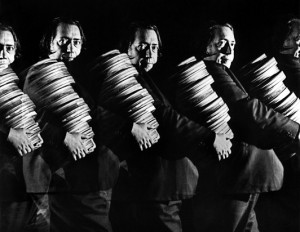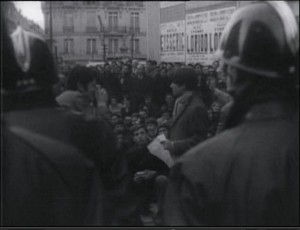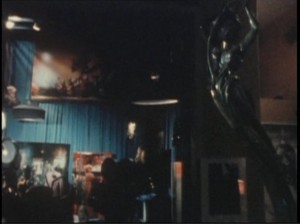Comics needs an Henri Langlois.
As collectors, most comics geeks have nothing on Langlois. I don’t care how many storage units you have. I know the longboxes block the closet. But from the ‘30s through the ‘70s, back in the days when a single film could take up several cans and a couple square feet of space, Langlois and his wife accumulated and preserved over 60,000 films, using primarily their own money, creating out of his collectors’ obsession the institution known as the Cinémathèque Francaise.
His scope was omnivorous: “People, intent on triage, who think they have taste, me included, are idiots. One must save everything.” He rescued numerous nitrate prints of silent movies and the only existing negative of The Blue Angel; he saved early Soviet cinema and “decadent” films from the Nazis; he stole film prints from the back rooms of movie houses that were about to destroy them (theaters destroyed their film prints to prevent piracy). For decades, he screened three films a day in his house in Paris, carefully selecting the films for the resonance of their justaposition. His screenings introduced the auteurs of the French New Wave to the American cinema that would define them and to the early European art cinema that would inspire them to transcend Hollywood.
But his archival impulse, and even his passion for sharing his films, are not why comics needs a Langlois. (Bill Blackbeard has all that mostly covered.) Comics needs a Langlois because of his particular inspired belief, poetic, imaginative, and non-didactic, about how cinema’s history should inspire its future:
An art form requires genius. People of genius are always troublemakers, meaning they start from scratch, demolish accepted norms and rebuild a new world.
An odd sentiment for an archivist – to “start from scratch, demolish accepted norms.” Especially an archivist so intent on screening and programming, whose model for training in cinema was to organize one’s life around watching films, to complete immerse oneself in cinematic heritage and in conversation with other people who are equally immersed. This is the man who comforted Buñuel after the disasterous premiere of El at Cannes (and who introduced the film to Lacan), the man selected to pin the Legion of Honor on Alfred Hitchcock’s lapel. When protests broke out after the French government shut down the Cinematheque in 1968 for bad bookkeeping, Godard took a punch from a policeman on Langlois’ behalf (it broke his glasses, not his face, but still…)
Leaud speaking to the protesting crowd, 1968
How can we reconcile the historian archiving the past with the poet advocating the genius’ new world? Langlois himself suggests the answer in a story he tells about his childhood experience viewing Mèliés’ 1899 film Jeanne d’Arc:
As a boy in Turkey, they told me Joan of Arc took Paris. Knowing my dad was posted there, when I saw Jeanne d’Arc, I believed he was living in Joan’s Paris. Told that was wrong, I began to imagine parallel Parises: Joan’s, my father’s, etc. Hence, in my somewhat odd view, time isn’t time: it’s space.
Although the concepts are surely related, Langlois is not describing the relation of time and space found in Chris Ware – Ware’s use of space to evoke time, to transform our sense of time, and to highlight both pointed and sequential continuity through time, is still ultimately an exploration of temporality and its effects: of an experience living in history. Langlois’ formulation is the denial of time: an idea of history not as something past, things having happened and remembered, but something entirely now, aggregated all together, present – meaning both presence and in the present tense.
This idea of “history in the present tense” — omnipresent history — is both very French and very characteristic of Langlois’ time and his circle of friends. Forming in the years after WWII, the idea was influenced not only by Surrealism and Dada but by Sartre and Levi-Strauss and Lacan and their project of reimagining realism without materialism – the bloody, painful materialism of the wars and their aftermath. Structuralism’s forgetting of “history in the past tense” was an effort to find inspiration and humanity despite that trauma, and the result of their efforts was a concept of history that serves human imagination rather than subordinating imagination to the dictates of history and materialist historical thinking.
This sensibility is nowhere more apparent than in the Museum of Cinema that Langlois assembled in the last decade of his life.
An exhibit room at the Musée du Cinema
Langlois’ curatorial choices, although rich with minute historical detail, were almost completely non-chronological and non-genealogical. He cared about establishing composite effects among the films and artifacts, emphasizing thematic contiguity, resonance and suggestion. The result was a Museum that was itself a work of art, not of history, an experience that inspired questions and curiosity rather than a lesson that offered canned, approved answers. The 2004 documentary Henri Langlois: Phantom of the Cinematheque (from which these English translations of the Langlois quotes are taken) posits convincingly that the museum itself was as much the work of an “auteur” as any New Wave film.
Notions of resonance and suggestion and composite seem very at home in comics, even more so than film. Images accrue meaning through juxtaposition far more than in the dynamic cinema or even in prose text, which always retains at least some small echo of the temporality of spoken language. Langlois’ approach to history – never for its own sake but always in the service of imagination, not the trace of the past but the texture of the present, always pointing toward the future – is particularly inspirational as an antidote to nostalgic minutiae, the biggest obstacle to the troublemaker’s new world:
There are cinéphiles and cinéphages. Truffaut is a cinéphile. A cinéphage – a film nerd – sits in the front row and writes down the credits. If you ask him whether it’s good, he’ll say something sharp. But that’s not the point of movies: to love cinema is to love life, to really look at this window on the universe. It’s incompatible with note-taking!
The documentary from which the quotes and stills in this essay were taken is worth every minute of the time spent watching it. It’s currently available on DVD and Netflix on Demand.



